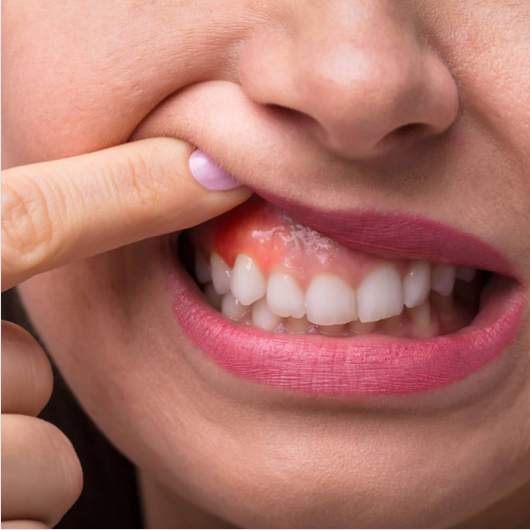Understanding Periodontal (Gum) Disease and How to Prevent It
Periodontal (gum) disease is a common but serious condition that affects the gums and bone supporting your teeth. If left untreated, it can lead to tooth loss and other health problems. This article will explain what periodontal disease is, its causes, symptoms, stages, and offer practical homecare tips to keep your gums healthy.
What is Periodontal Disease?
Periodontal disease, commonly known as gum disease, is an infection of the tissues that hold your teeth in place. It is typically caused by poor oral hygiene, which allows plaque—a sticky film of bacteria—to build up on the teeth and harden. In its early stage, called gingivitis, gums become swollen, red, and may bleed. If not treated, gingivitis can progress to periodontitis, a more severe form where gums pull away from the teeth, bone is lost, and teeth may loosen or fall out.

Symptoms of Periodontal Disease
Recognizing the signs of periodontal disease early is crucial for effective treatment. Common symptoms include:
- Red, swollen, or tender gums
- Bleeding gums during brushing or flossing
- Persistent bad breath or a bad taste in the mouth
- Receding gums, making teeth appear longer
- Formation of deep pockets between teeth and gums
- Loose or shifting teeth
Stages of Periodontal Disease
Gingivitis: The earliest stage of gum disease, characterized by inflammation of the gums. It is reversible with good oral hygiene and professional treatment.
Mild Periodontitis: Untreated gingivitis can progress to periodontitis, where the infection spreads below the gum line, causing bone loss and forming pockets around the teeth.
Moderate to Advanced Periodontitis: In these stages, there is significant bone loss, deep pockets, and potential tooth loss. Treatment may involve more intensive cleaning procedures, and in some cases, surgery.
Mild Periodontitis: Untreated gingivitis can progress to periodontitis, where the infection spreads below the gum line, causing bone loss and forming pockets around the teeth.
Moderate to Advanced Periodontitis: In these stages, there is significant bone loss, deep pockets, and potential tooth loss. Treatment may involve more intensive cleaning procedures, and in some cases, surgery.
Treatments for Periodontal Disease
If you have signs of periodontal disease, professional treatment is essential. Treatment options may include:
- Scaling and Root Planing: A deep-cleaning procedure that removes plaque and tartar from above and below the gum line and smooths the tooth root to help the gums reattach to the teeth.
- Medications: Antibiotic gels or oral antibiotics may be used to control bacterial infection.
- Surgery: In severe cases, surgical procedures such as flap surgery or bone and tissue grafts may be necessary to restore supportive tissues.
Homecare Tips to Prevent and Manage Periodontal Disease
Preventing periodontal disease starts with good oral hygiene practices. Here are some essential tips to help you maintain healthy gums:
Brushing:
Brushing:
- Brush your teeth twice a day with a fluoride toothpaste.
- Use a soft-bristled toothbrush and replace it every three to four months or sooner if the bristles are frayed.
- Ensure you brush all surfaces of your teeth, including the outer, inner, and chewing surfaces, as well as your tongue to remove bacteria.
Flossing:
- Floss daily to remove plaque and food particles from between your teeth and under the gum line.
- You can also use interdental brushes, wooden or plastic picks, or a water flosser as recommended by your dentist.
Regular Dental Visits:
- Visit your dentist routinely for check-ups and professional cleanings.
- Professional cleanings remove tartar (hardened plaque) that cannot be removed by brushing and flossing alone.
- Regular dental visits also allow early detection and treatment of any signs of gum disease.
Healthy Lifestyle Choices:
- Quit smoking, as it is a significant risk factor for developing periodontal disease. Smoking weakens the immune system, making it harder to fight off gum infections.
Periodontal disease is a serious condition that can have lasting effects on your oral and overall health if left untreated. By practicing good oral hygiene, making healthy lifestyle choices, and visiting your dentist regularly, you can prevent and manage gum disease effectively. Our team is dedicated to providing you with the best care and guidance to maintain a healthy, beautiful smile. Schedule your appointment today to take the first step towards optimal gum health.
Address
Level 1, 60 Willoughby Rd, Crows Nest.
Level 1, 60 Willoughby Rd, Crows Nest.
Hours
Monday 8am-6pm
Tuesday 8am-6pm
Wednesday 8am-6pm
Thursday 8am-6pm
Friday 8am-5pm
Saturday 8am-12pm
Closed Sundays & public holidays
